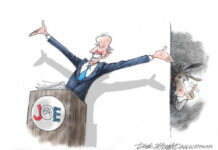
Brace yourselves, folks—Senator Ted Cruz is sounding the alarm, and it’s about as loud as it gets. If his latest interview on Newsmax doesn’t wake people up, I don’t know what will.
In a recent Newsmax interview, Senator Ted Cruz (R-Texas) expressed grave concerns about the rising risk of a terrorist attack on American soil, which he claims is the highest since September 11, 2001. Citing the Israel-Hamas conflict and what he calls an “open border” at the southern U.S. border, Cruz argues that the Biden administration is practically inviting terrorists into the country. These accusations demand serious attention, as he discusses introducing the Hamas Sanctions Act to counter these threats.
How bad is it? Senator Cruz didn’t mince words. He attributes the heightened risk not only to the ongoing war in the Middle East but also to what he labels an “open border policy” in the southern U.S.. Cruz argues that this combination is a potent recipe for disaster, potentially allowing bad actors easy access to the United States.
Senator Cruz’s concern is rooted in the tragic events unfolding in the Middle East. On October 7, Hamas launched a surprise attack on Israel, prompting a quick declaration of war from Israel. Since then, thousands of civilians have perished. While officials initially claimed there was no direct threat to the U.S., recent events suggest otherwise. Nearly 80% of respondents in a recent poll expressed concern over the possibility of a terrorist attack within the United States due to the ongoing conflict.
“I believe we’re at greater risk today for a major terrorist attack in the United States than we have been at any time since September 11,” Cruz said Monday on Fox News. “And you combine war in the Middle East with open — an open border on our southern border.”
Apart from the war, the number of antisemitic and Islamophobic incidents in the U.S. has surged. FBI Director Christopher Wray highlighted “historic” levels of antisemitism and pointed out that the leading terrorism threat comes from lone actors or small groups radicalized online.
In response to these developments, Senator Cruz introduced the Hamas Sanctions Act. This Act aims to impose sanctions on any entities that support Hamas, cutting off funds and preventing safe havens for their leaders. Despite the initial claims that there’s no direct threat to the U.S., the FBI has been hard at work. Its investigations have unveiled that the threat from homegrown violent extremists (HVEs) and other lone actors inspired by foreign terrorist organizations is the most significant risk currently facing the United States.
“The administration also refuses to enforce sanctions against Hamas for terrorism, for the use of human shields, or against those who violate terrorism sanctions and provide Hamas with financial or material support,” Cruz said in a statement.
Officials are also worried that foreign terrorist organizations might exploit drug smuggling networks at the southern border to infiltrate the U.S. While the FBI asserts that Hamas currently lacks the capability or intent to operate within U.S. borders, there’s concern that sympathizers could still engage in violence.
The gravity of the threat cannot be understated. FBI Director Christopher Wray and other officials continue to highlight the risks posed by terrorist organizations like Hezbollah, Al Qaeda, and ISIS. The most immediate worry, however, remains homegrown violent extremists influenced by the conflicts in the Middle East. With ongoing FBI investigations into threats related to the Israel-Hamas conflict, the need for sustained vigilance in matters of national security becomes even more critical.
“The likelihood of a significant terrorist attack in the homeland has almost certainly increased since the beginning of the Israel-Hamas conflict. Multiple terrorist groups — including ISIS and al-Qaida — have leveraged the crisis to generate propaganda designed to inspire followers to conduct attacks, including in North America. The increasingly diffuse nature of the transnational terrorist threat challenges our law enforcement partners’ ability to detect and disrupt attack plotting against the homeland and leaves us vulnerable to surprise.” – Gen. Gregory M. Guillot
Let’s be clear—any policies or actions perceived to invite terrorists into our country require immediate and comprehensive review. If there’s one thing we’ve learned, it’s that complacency in national security is a recipe for disaster. We must remain vigilant and proactive to protect our nation from these growing threats.














